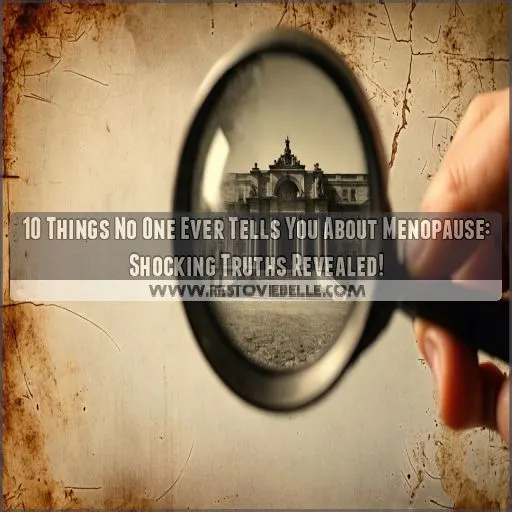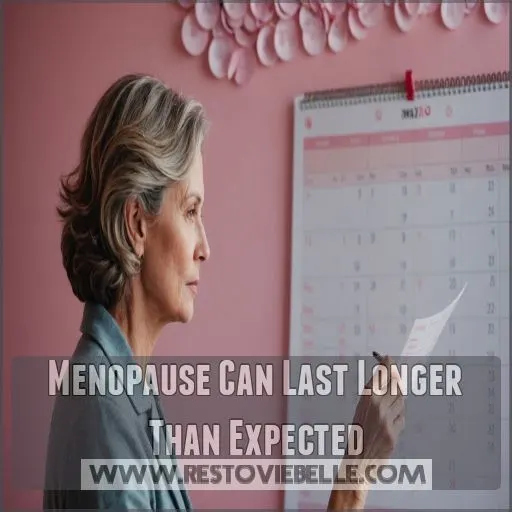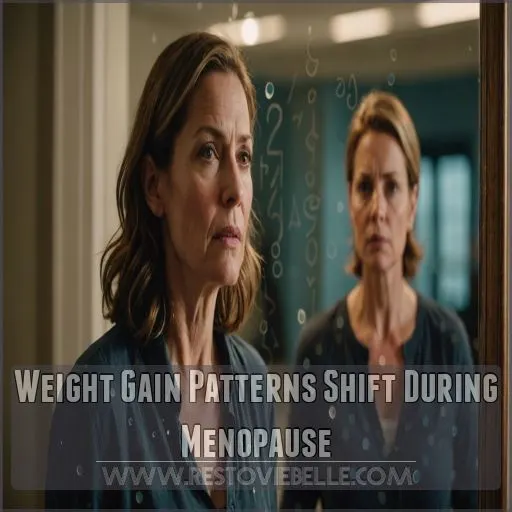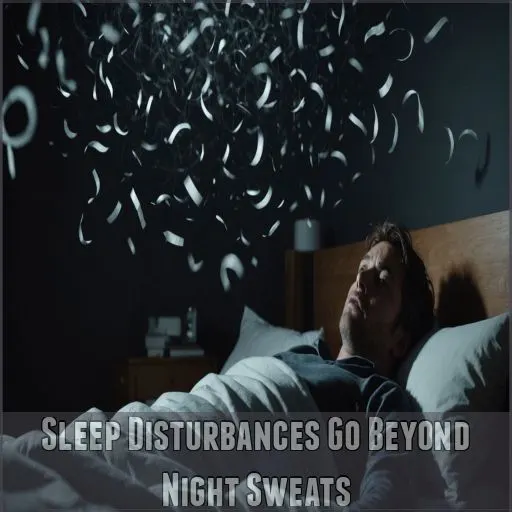This site is supported by our readers. We may earn a commission, at no cost to you, if you purchase through links.

You might think it’s just hot flashes and mood swings, but it’s a whole new ball game.
Your body’s about to go on a wild ride, from hair growing in places you never expected to your skin pulling a Benjamin Button.
Sleep? That’s cute. You’ll be reacquainted with 3 AM like it’s your long-lost friend.
And don’t get me started on the brain fog – you’ll feel like you’re living in London on a particularly soupy day.
But here’s the kicker: it’s not all doom and gloom. There’s a silver lining you won’t believe.
Table Of Contents
- Key Takeaways
- Menopause Can Last Longer Than Expected
- Hot Flashes Aren’t Just About Feeling Warm
- Weight Gain Patterns Shift During Menopause
- Unexpected Changes in Hair Growth Occur
- Sleep Disturbances Go Beyond Night Sweats
- Cognitive Changes Can Be Surprising
- Urinary and Vaginal Health Issues Arise
- Skin Undergoes Significant Transformations
- Bone Health Becomes a Major Concern
- Emotional and Social Dynamics Shift
- Frequently Asked Questions (FAQs)
- Conclusion
Key Takeaways
- You’re in for a longer ride than you might think—menopause can last for years, and symptoms can persist long after your last period. It’s more of a marathon than a sprint, so pace yourself and be patient with your body.
- Your body is going to play some sneaky tricks on you, from unpredictable hot flashes to surprise hair growth in places you never expected. Think of it as your own personal game of "Whack-a-Mole"—you never know what’s going to pop up next!
- Your brain isn’t immune to the menopause rollercoaster. You might find yourself in a fog one minute and sharp as a tack the next. Don’t worry, you’re not losing it—it’s just your hormones doing the cha-cha in your head.
- It’s not all doom and gloom—menopause can bring some unexpected perks. You might discover a newfound sense of freedom, improved emotional regulation, and even a boost in your emotional intelligence. It’s like leveling up in the game of life!
Menopause Can Last Longer Than Expected
You might think menopause is a quick change, but surprise! It’s more like a marathon than a sprint.
From your 30s to well into your 60s, you could be riding the hormone rollercoaster, with symptoms that stick around long after your last period.
Duration Varies Significantly Among Women
Buckle up, ladies! Menopause isn’t a one-size-fits-all rollercoaster.
You might be in for a longer ride than you thought. While some women breeze through in a few years, others find themselves on this hormonal journey for over a decade.
Your genetic makeup, lifestyle, and even cultural background can influence how long you’ll be dealing with hot flashes and mood swings.
So, grab your fan and let’s explore the unpredictable timeline of this midlife adventure!
Symptoms May Persist for Years After Onset
Menopause isn’t a quick pit stop on your life journey.
You might be in for a longer ride than expected. Studies show that for over half of women, frequent hot flashes can last more than 7 years during the change of life and persist for 4.5 years after your final period.
African American women often experience the longest duration, with symptoms lasting a median of 10.1 years.
Don’t worry, though – you’re not alone in this extended adventure, and it’s just a part of the change of life.
Perimenopause Can Start in Your 30s or 40s
Think those hot flashes are years away? Think again. Perimenopause can knock on your door as early as your mid-30s. It’s like your body’s sneak preview of menopause, complete with irregular periods and hormone rollercoasters.
With hormonal changes affecting skin, this shift can also bring about skin concerns like adult acne and dryness, making a customized skincare routine essential, especially one that incorporates skin care for your 30s.
Don’t panic – it’s totally normal, but it might throw you for a loop. Talk to your doc about early onset signs and lifestyle tweaks to keep you feeling like a boss.
Post-menopausal Symptoms Can Continue for a Decade
You might think menopause ends with your last period, but guess what? The post-menopausal journey can last up to a decade!
It’s like an aurora that lingers long after you expect it to fade.
Hot flashes, mood swings, and vaginal dryness might stick around, affecting your post-menopause health.
But don’t worry – with the right lifestyle adjustments and treatment options, you can manage these symptoms and embrace this new chapter with confidence.
Hot Flashes Aren’t Just About Feeling Warm
You might think hot flashes are just about feeling warm, but they’re a wild rollercoaster ride for your body.
These pesky power surges can leave you shivering one minute and drenched in sweat the next, turning your day (and night) into an unpredictable temperature tango.
They can also disrupt your life with unpredictable patterns.
Can Cause Sudden Chills and Night Sweats
Many women experience a wild rollercoaster ride during menopause.
Your body’s thermostat goes haywire, causing sudden chills followed by intense night sweats.
It’s like your own personal aurora borealis, with unpredictable intensity that can disrupt your sleep. You might find yourself shivering one minute and drenched the next.
Don’t worry, though – this internal light show is normal.
Breathable pajamas and a cool bedroom can help you weather these menopausal storms.
May Trigger Anxiety or Heart Palpitations
Suddenly, your heart races like you’re aurora hunting in the arctic. Hot flashes aren’t just about feeling warm; they can trigger anxiety and heart palpitations that make you feel like you’re on an emotional roller coaster .
These hormonal storms can leave you feeling drained and on edge.
But don’t worry, you’re not losing it. With the right coping strategies and lifestyle changes, you can weather this menopausal aurora and regain your inner calm.
Can Disrupt Sleep and Daily Activities
Hot flashes aren’t just an internal inferno; they’re sleep-stealing, day-disrupting gremlins.
Imagine this: you’re drifting off when suddenly, you’re in your own personal aurora zone, sheets drenched. It’s like an unwanted midnight aurora tour!
These nocturnal light shows can leave you battling menopause fatigue and brain fog by day. But don’t despair – developing a bedtime routine can help tame these fiery nighttime intruders.
Intensity and Frequency Vary Widely
You might think hot flashes are a one-size-fits-all experience, but they’re more like a roller coaster ride – unique for everyone. Some women barely break a sweat, while others feel like they’re standing in the aurora borealis.
Here’s the scoop on hot flash variety:
- Frequency: From once a week to hourly
- Duration: Seconds to several minutes
- Intensity: Mild warmth to full-on inferno
- Triggers: Spicy foods, caffeine, or stress
Don’t let these symptoms control you. You’ve got the power to navigate this wild ride!
Weight Gain Patterns Shift During Menopause
You might notice your jeans feeling a bit snug in new places during menopause – don’t panic, it’s not just you!
As your hormones shift, your body decides to play a game of fat redistribution, making weight management a whole new adventure.
Hormonal Changes Affect Fat Distribution
Menopause’s body-reshaping effect might catch you off guard.
Those hormonal changes aren’t just triggering hot flashes; they’re giving your fat a serious makeover. Your once-predictable weight patterns are doing a disappearing act, replaced by stubborn belly fat.
It’s like your body’s playing a cruel game of "hide and seek" with your waistline. But don’t worry, you’ve got this. Embrace whole grains and fresh fruits to fight back against this midlife plot twist.
Metabolism Slows, Making Weight Loss Challenging
Battling the bulge becomes a real head-scratcher during menopause. Your metabolism slows down, making weight loss feel like climbing Everest in flip-flops (Source). On top of that, hormonal changes can also lead to increased sebum production, causing oily skin woes.
To combat this, try incorporating salicylic acid products into your skincare routine to help manage pore size and reduce oiliness.
Don’t throw in the towel just yet! Boost your protein intake by 1-3% to curb cravings and keep those extra pounds at bay. Mix up your diet strategies and exercise routines to outsmart your changing body.
Remember, you’re not alone in this weight loss tango!
Muscle Mass Tends to Decrease
As menopause sneaks up, your muscles might start playing hide-and-seek. Hormonal changes during this time can lead to a decrease in muscle mass, making you feel weaker and less toned. This shift in body composition isn’t just about looks – it affects your overall health and metabolism.
Here’s what you might experience:
- Clothes fitting differently, even if the scale hasn’t budged
- Everyday tasks feeling more challenging than before
- A gnawing worry about losing your strength and independence
Don’t fret! With the right protein intake and exercise routines, you can fight back against muscle loss and age-related changes.
Importance of Strength Training Increases
Why let menopause muscle you out of your strength? It’s time to flex those menopausal muscles! Strength training isn’t just a suggestion; it’s your secret weapon against muscle loss and bone density decline.
You’ll boost your metabolism faster than you can say "hot flash," and prevent injuries like a superhero.
Check out this powerhouse of benefits:
| Benefit | Impact | Action |
|---|---|---|
| Muscle gain | Reverses loss | Lift weights 3x/week |
| Bone density | Increases | Do weight-bearing exercises |
| Metabolism | Revs up | Include HIIT workouts |
Unexpected Changes in Hair Growth Occur
You might think you’ve got your hair routine down pat, but menopause has other plans.
Get ready for a wild ride as your locks thin out up top while sprouting in surprising new spots.
Leaving you wondering if you’ve accidentally stumbled into a hair-growth funhouse.
Thinning Hair on Scalp Becomes Common
You’ve conquered weight gain, but now your mane’s thinning? Don’t panic! Hormonal shifts can wreak havoc on your locks.
Here’s what you need to know:
- Up to 100 strands of hair loss daily is normal
- Minoxidil (Rogaine) can stimulate regrowth in 2 out of 3 people
- Finasteride slows hair loss in 90% of men
Remember, you’re not alone. Explore hair care routines and scalp health treatments to reclaim your crowning glory. It’s time to flip the script on thinning hair!
Facial Hair Growth May Increase
Out of the blue, you might spot a few unexpected whiskers on your chin. Don’t panic!
It’s just your hormones playing tricks. With less estrogen and relatively more testosterone, your face decides to sprout some peach fuzz.
It’s like your body’s throwing you a curveball, but you’ve got options.
From tweezers to lasers, there’s a solution that’ll help you feel like yourself again, and get back to your normal self with a solution that’ll help you feel like yourself again.
Body Hair Patterns Can Change
Hold onto your hairbrush, ladies!
Your body hair’s about to pull a disappearing act – or pop up in unexpected places. Those hormonal hijinks are at it again, shifting your hair growth patterns like a game of whack-a-mole.
You might notice thinning on your legs but suddenly sprout a few chin whiskers. Don’t fret – it’s all part of the menopausal makeover.
Just remember: when life gives you new hair, grab your favorite removal method and roll with it! (Source)
Hair Texture and Color Alterations
Get ready for a hair-raising experience! Menopause isn’t just about hot flashes; it’s like your locks are putting on their own northern lights show. Your mane might go through more changes than a chameleon in a candy store.
Here’s what’s in store:
- Texture transformation: Once silky strands turn wiry and rebellious
- Color conundrum: Silver strands sprout like wildflowers in a field
- Volume vanishing act: Your once-lush locks start playing hide and seek
Don’t fret! These changes are as natural as avoiding high-fructose corn syrup. Embrace your new ‘do and rock it like a boss!
Sleep Disturbances Go Beyond Night Sweats
You thought night sweats were the only sleep thief during menopause?
Think again. Menopause can turn your once-peaceful nights into a frustrating mix of insomnia, sleep-deprived issues.
Menopause can cause a mix of insomnia, sleep apnea, and even restless leg syndrome.
Making you feel like you’re starring in your own personal sitcom.
Insomnia Becomes More Prevalent
Tossing and turning become your nightly companions during menopause. You’re not alone – up to 60% of menopausal women experience insomnia. Hormone changes wreak havoc on your sleep patterns, leaving you exhausted.
But don’t despair! Improve your sleep hygiene by sticking to a regular schedule and creating a bedtime routine. Natural remedies like exercise can help too.
If sleepless nights persist, talk to your doctor about hormone therapy or other options.
Sleep Apnea Risk Increases
As you journey through menopause, your risk of sleep apnea quietly rises.
You might think night sweats are your only sleep nemesis, but there’s a stealthy culprit lurking.
Postmenopausal women are two to three times more likely to develop sleep apnea than their premenopausal counterparts.
This sneaky sleep disruptor can masquerade as typical menopause symptoms, making it tricky to spot.
Don’t let it steal your rest – talk to your doctor if you’re feeling unusually tired during the day.
Restless Leg Syndrome May Develop
Your legs might start doing the cha-cha without your permission. Restless leg syndrome often crashes the menopause party, making your limbs feel like they’ve got ants in their pants.
It’s not just annoying; it can seriously mess with your sleep. Don’t worry, you’re not going crazy – it’s a real condition that affects many women during this time.
Treatment options, from iron supplements to medications, can help tame those dancing legs, and provide relief from the symptoms of menopause party.
Changes in Sleep Cycles and Patterns
Menopause throws a wrench in your sleep cycles, turning you into a night owl against your will. You might find yourself wide awake at 3 AM, scrolling through social media.
Sleep apnea can crash the party too, leaving you feeling like you’ve run a marathon in your sleep.
Don’t be surprised if daytime fatigue becomes your new frenemy. But don’t worry, tweaking your sleep hygiene can help you reclaim those precious Z’s.
Cognitive Changes Can Be Surprising
You might think menopause is just about hot flashes, but your brain’s in for a wild ride too.
From sudden brain fog to surprising mood swings, your mind’s going through its own little revolution.
And it’s not all bad news.
Brain Fog and Memory Lapses
Ever feel like your brain’s been replaced with cotton wool?
Welcome to the wild world of menopausal brain fog! You might find yourself forgetting names, misplacing keys, or writing endless to-do lists. Don’t panic – it’s not early-onset dementia.
Blame those pesky hormones messing with your mental sharpness. The good news? You can fight back with simple lifestyle tweaks.
Ready to reclaim your razor-sharp mind?
Difficulty Concentrating or Multitasking
Remember that "to-do" list you used to breeze through? Now it’s like trying to juggle flaming torches while riding a unicycle. Welcome to menopause brain! You’re not losing it; your mind’s just playing hide-and-seek.
Hormonal imbalances can also affect hair growth, leading to thinning, and low-level laser therapy (LLLT) has been shown to stimulate hair growth in some cases Best Hair Loss Treatments for Men.
One minute you’re laser-focused, the next you’re wondering why you’re holding the TV remote in the fridge. Don’t fret – it’s all part of the wild ride.
Increased Risk of Mood Disorders
Your brain’s not just playing tricks on you – hormonal shifts can shake up your emotions too. As estrogen levels dip, you might find yourself on an emotional rollercoaster. Here’s what you need to know:
- Depression risk doubles during perimenopause
- Anxiety can spike, especially if you’ve had it before
- Past mood issues increase your chances of experiencing them again
Don’t let these mood swings throw you off balance. With the right coping strategies and treatment options, you’ll weather this storm like a champ.
Potential for Enhanced Emotional Intelligence
Menopause might just be your emotional intelligence superpower in disguise. As you navigate this rollercoaster, you’re actually fine-tuning your empathy and self-awareness . It’s like upgrading your emotional toolbox.
Check out how menopause can boost your EQ:
| EQ Skill | Before | After |
|---|---|---|
| Self-awareness | "I’m fine" | "I need space" |
| Empathy | Eye-rolling | Heart-to-hearts |
| Communication | Bottling up | Expressing freely |
Embrace the change – you’re not just going through menopause, you’re growing through it!
Urinary and Vaginal Health Issues Arise
You might think your nether regions are off the hook during menopause, but surprise.
Your urinary and vaginal health can take some unexpected twists and turns.
From pesky UTIs to a suddenly uncooperative pelvic floor, your body’s going to keep you on your toes down there.
Increased Susceptibility to Urinary Tract Infections
Uh-oh, here’s a burning issue you didn’t see coming: menopause can turn your urinary tract into a hotbed for infections. As estrogen levels drop, your body’s natural defenses take a hit, leaving you more vulnerable to UTIs.
Don’t blame yourself – it’s not about hygiene or bedroom antics. Instead, focus on prevention: stay hydrated, pee after sex, and consider vaginal estrogen treatments to keep those pesky bacteria at bay.
This approach can help keep your urinary tract healthy, especially when considering vaginal estrogen treatments to maintain a balance and reduce the risk of infections.
Vaginal Dryness and Discomfort
The desert-like dryness down there isn’t just a minor inconvenience.
It’s like your body’s playing a cruel joke, leaving you feeling parched where you least expect it.
But don’t throw in the towel just yet! Vaginal moisturizers can be your oasis, keeping things comfy and preventing that sandpaper sensation (Source).
And remember, water-based lubricants are your best friends for those intimate moments.
Embrace self-care and kiss those menopause myths goodbye!
Changes in Libido and Sexual Function
While vaginal dryness might’ve thrown you for a loop, buckle up for the rollercoaster ride of libido changes! Your sex drive’s about to go on quite the adventure.
Here’s what you might experience:
- Desire fluctuations that’ll make you feel like a hormonal teenager again
- Lubrication issues that turn foreplay into a necessity, not just fun
- Slower arousal, like your body’s on island time
- New erogenous zones – time to explore!
Don’t fret; with some creativity and communication, you can keep your love life sizzling.
Pelvic Floor Weakening and Incontinence Risk
During menopause, your pelvic floor muscles might start acting like a trampoline with a few too many holes. You’ll want to befriend Kegels – they’re your secret weapon against unexpected leaks.
Imagine your pelvic floor as a hammock; it needs some TLC to stay strong.
Ditch the heavy lifting, shed extra pounds, and say goodbye to smoking. With a few lifestyle tweaks, you’ll be back in control, no sweat!
Skin Undergoes Significant Transformations
You might think your skin’s seen it all, but menopause brings a whole new set of surprises.
From sudden dryness to surprise breakouts, your skin’s about to go on its own wild adventure.
Increased Dryness and Itching
Say goodbye to your smooth, dewy complexion! Menopause turns your skin into a desert, leaving you itching like you’ve rolled in poison ivy.
Your estrogen levels plummet, robbing your skin of its natural oils and collagen.
But don’t despair! Slather on moisturizers, try natural remedies like coconut oil, and consider hormone therapy to combat dryness, just like how you’d use carrier oils for essential oil effectiveness
.
Remember, you’re not alone in this itchy adventure – it’s a whole-body phenomenon!
Accelerated Aging and Wrinkle Formation
You’ve tackled the dryness, but now your skin’s playing a new game: the wrinkle race.
Menopause turbocharges aging, and you might feel like your face is transforming overnight.
Don’t panic! Your skincare routine needs a power-up. Boost collagen production with retinoids and peptides.
Sun damage is your nemesis, so slather on that SPF like it’s your superhero cape. Lifestyle factors are your secret weapon against Father Time.
Genetics play a role, but remember that you have control over how you age.
Changes in Skin Elasticity and Thickness
Those wrinkles aren’t the only skin surprises menopause has in store. Your skin’s going through a major makeover, and it’s not just skin-deep.
As estrogen levels drop, your skin’s elasticity and thickness take a hit. It’s like your skin forgot how to bounce back!
Here’s what’s really happening:
- Collagen production slows down, making your skin less firm
- Skin hydration decreases, leading to dryness and itchiness
- Your skin’s barrier function weakens, making it more sensitive
Don’t panic! A good skincare routine and sun protection can help you weather this change.
Potential for Adult Acne Outbreaks
Just when you thought your teenage zit days were over, menopause throws you a curveball. Hormonal acne can make an unwelcome comeback, turning your face into a battleground.
But don’t worry, you’ve got options: Over-the-counter products with salicylic acid, benzoyl peroxide, or glycolic acid can work wonders against acne, and consistent routines with OTC face washes containing benzoyl peroxide and hydroxy acid can help with mild acne.
Understanding your skin type is key for choosing the right products and creating a personalized routine, such as using a gentle cleanser and best acne treatments for men.
Armed with knowledge and a few tricks up your sleeve, you’ll show those pesky pimples who’s boss.
| Acne Triggers | Battle Strategies |
|---|---|
| Hormonal chaos | Skincare routine |
| Stress overload | Stress management |
| Diet disasters | Healthy eating |
| Lifestyle woes | Sleep and exercise |
Armed with knowledge and a few tricks up your sleeve, you’ll show those pesky pimples who’s boss!
Bone Health Becomes a Major Concern
You mightn’t realize it, but menopause turns your bones into a hot topic.
Your skeleton’s suddenly as high-maintenance as a diva, demanding calcium, vitamin D, and weight-bearing exercises to stay strong and avoid becoming as fragile as grandma’s china.
Increased Risk of Osteoporosis
While you’re busy moisturizing your changing skin, your bones are quietly losing density.
Menopause hits your skeleton like a silent thief, increasing your risk of osteoporosis.
It’s not all doom and gloom, though!
You can fight back by upping your calcium intake, doing weight-bearing exercises, and making smart lifestyle changes.
Think of it as giving your bones a much-needed pep talk to stay strong and resilient.
Joint Pain and Stiffness
Creaking joints got you feeling like a rusty door hinge? You’re not alone!
Menopause can turn your body into an achy-breaky mess. As estrogen levels drop, inflammation rises, causing joint pain and stiffness .
It’s like your body’s throwing a tantrum, but don’t let it slow you down. Stay active with low-impact exercises, try natural remedies, and chat with your doc about pain management options. You’ve got this, sister!
Importance of Calcium and Vitamin D
Your bones are crying out for attention during menopause.
As estrogen levels drop, your skeleton becomes a calcium sieve . But don’t panic – you’ve got the power to fortify your fortress.
Bump up your calcium intake to 1,200 mg daily and embrace vitamin D’s sunny disposition .
Think of it as building your internal armor, ready to conquer the world.
Your body’s changing, but you’re still the boss of your bones!
Need for Weight-bearing Exercises Increases
Ladies, menopause’s sneaky sidekick is bone loss. It’s time to flex those muscles and show your skeleton some love! Here’s why weight-bearing exercises are your new best friends:
- They combat the 10% bone density loss in the first 5 years after menopause
- They help manage weight as metabolism slows
- They reduce osteoporosis risk, which affects 1 in 10 women over 60
- They maintain muscle mass, essential for overall strength
Don’t let your bones become a game of Jenga – start building your strength today!
Emotional and Social Dynamics Shift
You’re not just saying goodbye to your periods; you’re welcoming a whole new you.
Menopause can spark surprising changes in your emotions and relationships, often leading to a fresh outlook on life and a newfound sense of freedom.
Increased Self-awareness and Introspection
Menopause brings a hidden gift: a journey of self-discovery.
You’ll find yourself diving deep into your thoughts, like a treasure hunter exploring uncharted waters.
This inner work isn’t just navel-gazing; it’s personal growth on steroids.
You might suddenly realize you’ve been wearing clothes that don’t suit your sensory needs.
It’s time to nurture your body and mind, opening doors to a more reflective, contemplative you.
Potential for Improved Emotional Regulation
With menopause comes a surprising silver lining: improved emotional regulation.
You might find yourself becoming a Zen master of your feelings. As hormones stabilize, you’ll likely experience fewer mood swings and develop better coping mechanisms.
It’s like your emotional intelligence is getting a major upgrade.
You’ll navigate stress with newfound grace, turning challenges into opportunities for growth. Embrace this change – you’re not just surviving menopause, you’re thriving through it!
Changes in Personal Relationships and Priorities
As your hormones shift, you’ll notice your relationships and priorities changing too. It’s like your emotional compass gets recalibrated.
You might find yourself:
- Craving more "me time" for self-care
- Reevaluating family dynamics with a fresh perspective
- Seeking deeper connections in romantic relationships
- Pruning your social circle to focus on meaningful friendships
Don’t be surprised if you start putting yourself first more often. It’s not selfish—it’s necessary. Embrace this chance to reshape your world.
Newfound Sense of Freedom and Purpose
You’ve climbed the mountain of change, and now you’re standing at the summit of a newfound freedom. It’s like someone handed you a blank canvas and said, "Paint your life."
You’re no longer a slave to biology. By embracing skincare routines that include powerful hydrating primers like essence for skin hydration, you can take control of your appearance and redefine how you feel in your own skin.
This is your time to redefine priorities, jump into self-discovery, and maybe even make a career shift. Embrace this chapter – it’s your story to write.
Frequently Asked Questions (FAQs)
How does menopause affect heart health?
Did you know women’s risk of cardiovascular disease doubles after menopause?
Your heart’s loyal friend, estrogen, takes a bow during menopause, leaving you more vulnerable.
But don’t fret! Lifestyle changes and regular check-ups can keep your ticker ticking strong.
Can environmental factors influence menopause symptoms?
Environmental factors can shake up your menopause journey.
Pollution might fast-track symptoms, while rising temperatures can turn up the heat on those pesky hot flashes.
It’s like Mother Nature’s playing a wild card in your hormonal deck!
What changes in libido occur during menopause?
Buckle up for a wild ride.
Your libido might roller-coaster during menopause.
Some folks experience a dip, while others find their desire revving up.
It’s like your body’s playing a game of hormonal musical chairs .
How does menopause impact oral and dental health?
Your mouth’s in for a wild ride during menopause.
Hormonal changes can lead to dry mouth, gum disease, and even tooth loss.
Don’t let your smile suffer – regular check-ups and a calcium-rich diet are your secret weapons.
Are there positive aspects to going through menopause?
You’ll bid farewell to periods and pregnancy worries, opening doors to newfound freedom.
Many women experience a zest for life, embracing challenges with confidence.
It’s like hitting the reset button on your personal growth journey.
Conclusion
Knowledge is power, especially in the area of menopause.
These 10 things no one ever tells you about menopause are just the tip of the iceberg. Your journey through this change is unique, and while it may throw some curveballs, it’s also a time of growth and self-discovery.
Embrace the changes, seek support, and remember: you’re not alone. With the right mindset and tools, you can navigate this new chapter like a boss.
Here’s to embracing the change and thriving through it all!
















